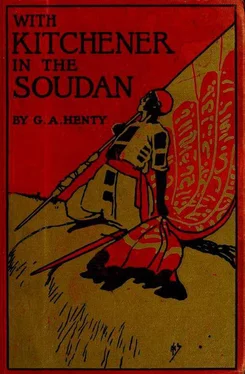Suddenly, as all on board were watching the effect of their fire, an outburst of musketry broke out from the bushes that lined the eastern bank a hundred yards away. Fortunately the greater part of the bullets flew overhead, but many rattled against the side. The Maxims were instantly turned upon the unseen enemy, the Soudanese fired volleys, and their rash assailants went at once into the thicker bush, many dropping before they gained it. The gun-boats now steamed slowly up the river, and then turning, retired down stream again, shelling the enemy's position as they passed. As they were going down they came upon a number of Dervishes who were busy unloading half a dozen native craft. The Maxim soon sent them flying, and the boats, which contained horses, donkeys, grain, and other goods, were taken in tow by the gun-boats, which anchored at the same island as on the previous night.
"Well, Bimbashi," Captain Keppel said, when the work for the day was over, " so you have had your first brush with the enemy. What do you think of it?
" I would rather that you did not call me Bimbashi, Captain Keppel. The title is ridiculous for me, and it was only given me that it might be useful when with Egyptian or Soudanese soldiers. I should feel really obliged if you would simply call me Hilliard. I felt all right, sir, during the fight, except that I envied the gunners, who were doing something while I had nothing to do but look on. It certainly made me jump when that shell struck the boat, because I had quite made up my mind that their guns would not carry so far, and so it was a complete surprise to me."
" Yes, it was a very harmless affair; still, it was good as a preparation for something more severe. You have got accustomed to the noise now, and that is always as great a trial to the nerves as actual danger."
"I wish I could be doing something, sir; everyone else had some duty, from yourself down to the black firemen,—even my servant made himself useful in carrying up shot."
"I tell you what I will do, Mr. Hilliard; I will get those marine sergeants to instruct you in the working of the Maxim and in the duties of the men attending on it. Then next time we come up I will put you in command of one of them. Your duties will not be severe, as you would simply direct the men as to the object at which they are to aim, watch the effect and direction of the bullets, and see that they change their aim as circumstances may direct. The black gunners are well trained and know their work; still, if by any chance the gun jams, it will be useful for you to be able to show them what to do even though they know it as well as, or better than, you do yourself. The blacks like being commanded by a white officer, and will feel pleased rather than otherwise at your being appointed to command their gun. Your lessons cannot begin for a day or two, for I have not done with Metemmeh yet."
" I am very much obliged to you indeed," Gregory said warmly. " I will take care not to interfere with the men's working of the gun."
"No, you will not have to do that; but a word or two of commendation when they make good practice pleases them immensely, and they will work all the better and faster for your standing by them."
At daybreak next morning the gun-boats went up again and engaged the forts as before. The Dervishes had placed more guns in position, but again the shells fell short, while those of the boats played havoc with the enemy's defences. Some ten thousand of the Dervish horse and foot came down near the town in readiness to repel any attempt at a landing. After some hours' bombardment the gun-boats retired. As they steamed away, the Dervish host were shouting and waving their banners, evidently considering that they had won a great victory. Having fulfilled their object, which was to retain Mahmud at Metemmeh by showing him that if he advanced against Merawi and Dongola we had it in our power to occupy the town, and so cut off his retreat and prevent reinforcements or stores from reaching him from Omdurman, the gun-boats returned to Berber.
So far Gregory had had no duties to perform in his capacity of interpreter, for no prisoners had been taken. On the way down the river one of the artillery sergeants explained the working of the Maxim to him, taking the weapon to pieces and explaining to him how each part acted, and then showing him how to put it together again. The sergeant having done this several times, Gregory was then told to perform the operation himself, and the lessons continued after their arrival at Berber. In the course of a week he was able to do this smartly, and had learned, in case of a breakdown, which parts of the mechanism would most probably have given way, and how to replace broken parts by spare ones carried up for the purpose. There was no long rest at Berber, and on the 1st of November the gun-boats again went up the river, reinforced by the Metemmeh, which had now arrived. Each boat, as before, carried fifty soldiers, and Major Stuart-Wortley went up as staff-officer. The evening before starting they received the welcome news that the railway line had that day reached Abu Hamed. This time there was but a short pause made opposite Metemmeh, and after shelling the forts, which had been added to since the last visit, they proceeded up the river
Shortly after passing the town a large Dervish camp was seen in a valley, and this, they afterwards found, was occupied by the force that had returned from Berber. A heavy fire of shell and shrapnel was opened upon it, and it was speedily destroyed. The gun-boats then went up as high as the sixth cataract. The country was found to be absolutely deserted, neither a peasant nor a Dervish being visible. Having thus accomplished the object of their reconnaissance, the flotilla returned, exchanged fire with the Metemmeh batteries, and then kept on their way down to Berber.
CHAPTER XI
A PRISONER
RATHER than remain unoccupied on board the gun-boat, Gregory went to Colonel Wingate's head-quarters and said that he should be very glad if he would allow him, while the flotilla remained at Berber, to assist in interrogating the fugitives who arrived from the south, and the spies employed to gain early information of the intentions and movements of the enemy. The position of the Dervishes at Metemmeh was becoming critical. The Khalifa was desirous that Mahmud should return with his force to Omdurman, there to take part in the battle in which, as he was convinced, the invaders would be annihilated. Mahmud, who was of an eager and impetuous disposition, was anxious to take the offensive at once, and either to march upon Merawi and Dongola, or to drive the British out of Berber.
There could be no doubt that his view was a more sagacious one than that of his father, and that the best tactics to be adopted were to harass the British advance, fall upon their convoys, cut their communications, and so oblige them to fall back for want of supplies. The Khalifa's mistake was similar to that made by Theodore in Abyssinia and Koffee Kalkalli in Ashanti. Had either of these leaders adopted the system of harassing the invaders from the moment they left the coast, it would have been next to impossible for the latter to arrive at their destination. But each allowed them to march on unmolested until within striking distance, then hazarded everything on the fortune of a single battle, and lost. Mahmud made no movement in obedience to the Khalifa's orders to retire to Omdurman, and the latter thereupon refused to send any further supplies to him, and Mahmud's army was therefore obliged to rely upon raids and plunder for subsistence.
These raids were carried out with great boldness, and villages situated within a few miles of Berber were attacked. The Dervishes, however, met with a much warmer reception than they had expected, for rifles and ammunition had been served out freely to the villagers; and these, knowing the fate that awaited them were the Dervishes victorious, offered so obstinate a resistance that the latter fell back discomfited. Early in January the Sirdar learned that the Khalifa had changed his mind, and had sent peremptory orders to Mahmud to advance and drive the British out of Berber and destroy the railway. Mahmud had now been joined by Osman Digna with five thousand men; and as the Egyptian troops, well as they had fought, had never yet been opposed to so formidable a force as that which Mahmud commanded, the Sirdar telegraphed to England for white troops. His request was at once complied with. The Warwickshires, Lincolnshires, and Cameron Highlanders were ordered to proceed from Cairo and Alexandria to the front, and the Seaforth Highlanders at Malta and the Northumberland Fusiliers at Gibraltar were also dispatched without delay. Major-general Gatacre was appointed to the command of the brigade.
Читать дальше












